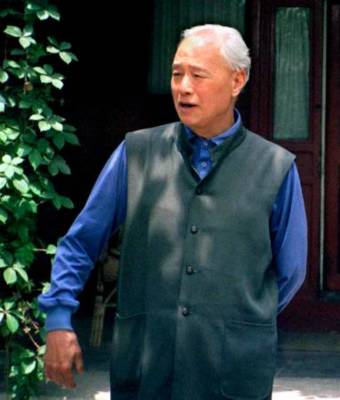Monday, January 17, 2005
RIP Zhao Ziyang

"BEIJING, Jan. 17 (Xinhuanet) -- Comrade Zhao Ziyang died of illness in a Beijing hospital Monday. He was 85.
Comrade Zhao had long suffered from multiple diseases affecting his respiratory and cardiovascular systems, and had been hospitalized for medical treatment for several times. His conditions worsened recently, and he passed away Monday after failing to respond to all emergency treatment."
Zhao Ziyang had been the chosen successor to Deng Xiaoping when he was ousted from his position as General Secretary of the CCP during the Tiananmen Square Protests of 1989. Zhao advocated dialogue with the student protestors and opposed the declaration of martial law. Zhao Ziyang made his final public appearance on May 19 at Tiananmen Square where he pleaded with the students to leave peacefully. Martial law was declared the next day and on June 4, 1989 PLA troops fought their way to Tiananmen and cleared the square. Zhao was under house arrest until his death on Monday morning in Beijing.
Wu Guoguang, a former speechwriter for Zhao Ziyang wrote about his former boss for Time:
It is noteworthy that the the Tiananmen affair in 1989 was touched off by the death of another popular leader and chosen successor to Deng Xiaoping who had also been ousted from the General Secretary position: Hu Yaobang. The situation is very different today in China. The leadership in China have learned a lot since 1989 and major protests seem unlikely. But such things can be unpredictable, and this would be the best opportunity for another spontaneous gathering in the capital since the Tiananmen Protests, and there may not be another for a very long time. No matter what happens on the street, there will likely be disagreements over the handling of Zhao's death within the CCP --for example his obituary and funeral -- though this will all occur behind closed doors. The official account of Zhao Ziyang's life will be complimentary but cautious: "A revolutionary Communist leader who was true to Marxist-Leninist-Mao Zedong Thought but made mistakes on the socialist path," or something like that. There will be no revision of the official CCP account of what happened at Tiananmen as long as Jiang Zemin is still alive because it would call in to question the legitimacy of his rise to power, and despite his retirement Jiang still holds a lot of informal influence.

"BEIJING, Jan. 17 (Xinhuanet) -- Comrade Zhao Ziyang died of illness in a Beijing hospital Monday. He was 85.
Comrade Zhao had long suffered from multiple diseases affecting his respiratory and cardiovascular systems, and had been hospitalized for medical treatment for several times. His conditions worsened recently, and he passed away Monday after failing to respond to all emergency treatment."
Zhao Ziyang had been the chosen successor to Deng Xiaoping when he was ousted from his position as General Secretary of the CCP during the Tiananmen Square Protests of 1989. Zhao advocated dialogue with the student protestors and opposed the declaration of martial law. Zhao Ziyang made his final public appearance on May 19 at Tiananmen Square where he pleaded with the students to leave peacefully. Martial law was declared the next day and on June 4, 1989 PLA troops fought their way to Tiananmen and cleared the square. Zhao was under house arrest until his death on Monday morning in Beijing.
Wu Guoguang, a former speechwriter for Zhao Ziyang wrote about his former boss for Time:
"When he invited me to leave my job as an editorial writer for the People's Daily to join his advisory committee on political reform, I had expected to be working with a protean party bureaucrat, an expert in cynical self-preservation. But when we had our first face-to-face talk in 1986, I found a paradox: a leader staunchly committed to dismantling the very system that supported his power.Zhao was accompanied by another aide in his final public appearance at Tiananmen, Wen Jiabao. Wen is now ranked third in the Chinese leadership.
Zhao called political reform 'the biggest test facing socialism.' As I grew to know him, I came to understand why. He believed economic progress was inextricably linked to democratization. As early as 1986, Zhao became the first high-ranking Chinese leader to call for cha e xuanju—elections offering a choice of candidates from the village level all the way up to membership in the Central Committee. His economic policies were, for their time and place, similarly progressive. He developed 'preliminary stage theory,' a course for transforming the socialist system that set the stage for much of the prosperity China enjoys today."
more...
It is noteworthy that the the Tiananmen affair in 1989 was touched off by the death of another popular leader and chosen successor to Deng Xiaoping who had also been ousted from the General Secretary position: Hu Yaobang. The situation is very different today in China. The leadership in China have learned a lot since 1989 and major protests seem unlikely. But such things can be unpredictable, and this would be the best opportunity for another spontaneous gathering in the capital since the Tiananmen Protests, and there may not be another for a very long time. No matter what happens on the street, there will likely be disagreements over the handling of Zhao's death within the CCP --for example his obituary and funeral -- though this will all occur behind closed doors. The official account of Zhao Ziyang's life will be complimentary but cautious: "A revolutionary Communist leader who was true to Marxist-Leninist-Mao Zedong Thought but made mistakes on the socialist path," or something like that. There will be no revision of the official CCP account of what happened at Tiananmen as long as Jiang Zemin is still alive because it would call in to question the legitimacy of his rise to power, and despite his retirement Jiang still holds a lot of informal influence.
